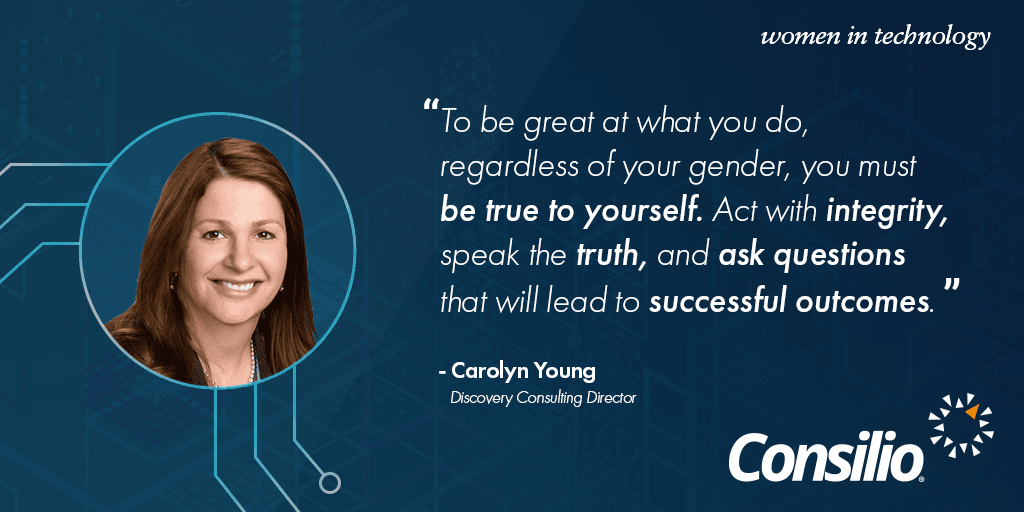 This blog is part of our ongoing Women in Technology series.
This blog is part of our ongoing Women in Technology series.
Carolyn Young is part of Consilio’s Advisory Services team, working as a Discovery Consultant Director. Carolyn has over 30 years of experience in technology, and she has worked specifically in legal technology for the last 16 years. With a focus on the complexities of Legal Hold and Information Governance, Carolyn works with clients to deploy new legal technology implementations and develop proactive discovery strategies involving data residing in both new and legacy systems. In addition, Carolyn consults with clients on their in-house system implementations, decommissioning efforts, and governance/remediation of data related to mergers, acquisitions, and spin-offs. Finally, Carolyn draws upon her extensive background to advocate for her clients, to protect them in their legal and regulatory obligations.
How did you get into this industry?
I worked in telecommunications for ten years, and I grew concerned with all the consolidations and other challenges the telecom field was experiencing. A good friend in the legal industry saw my potential and suggested I would be a great fit for eDiscovery. It took me a little while to transition, but I soon started working in the industry as a solutions consultant. After getting up to speed learning about the eDiscovery-related needs of law firms and corporations, I could leverage the technology skills from my telecom background. By applying those skills to solving problems for my clients in the legal space, I became a trusted advisor in short order.
What were some pivotal moments in your career that helped to get you to where you are today?
I’ve always had a desire to help people and deliver solutions that would exceed expectations. I’ve invested a lot of time in self-study to build my knowledge as a subject matter expert to achieve this goal. I also work to incorporate diverse perspectives when devising solutions, which requires me to draw on my past experiences in different roles such as Sales Engineer, Project Management, Sales and Operations. Probably the most pivotal moment in my career to date was when I realized what my background could bring to an organization like Consilio, where I could impact multiple areas of a company. My favorite compliment is when my colleagues introduce me to a client as “the glue that holds everything together.”
Have you ever noticed a time in your career where your gender proved to differentiate you?
When I first started working in the legal technology industry, I noticed a gender imbalance, with women under-represented. In telecom, I valued the professional connections with other women in my field, and I missed having that in legal. While I had a positive working relationship with my male colleagues, I wanted to connect with other women. That’s when I sought out some female colleagues in the industry to form an organization for women in legal technology. The group, which we named “Women in Chicago Litigation and Practice Support (ChicLit),” was a local success initially. Later, ChicLit inspired “Women in eDiscovery Group (WiE)” in Washington, DC. Eventually, ChicLit merged with WiE, and the combined organization rapidly expanded, with new chapters in cities in the U.S. and internationally.
What is your advice for someone working in a predominately male workplace?
Don’t feel pressure to change who you are or your approach to performing at your job. To be great at what you do, regardless of your gender, you must be true to yourself. Act with integrity, speak the truth, and ask questions that will lead to successful outcomes. If you do this, you will be able to sleep comfortably at night knowing you did your best and made a difference.
What do you think companies could do to motivate more women to pursue careers in technology?
One of the biggest things that technology companies can do is better support work/life balance initiatives. Let women know that they will be supported and valued throughout their working life, even after having families and can no longer work 90 hours per week or travel 15 days per month. Also, companies can develop programs that allow employees to use some of their working time to volunteer at non-profit organizations dedicated to reaching out to young women who might consider careers in the industry. For example, I recently had the chance to speak at a Women in Technology summit at my daughter’s high school. I gave a presentation about the impact of social media and your digital presence on future career opportunities. For me, the most rewarding part of the day was being able to spend time interacting with the attendees informally, at lunch and between sessions. I really enjoyed mentoring these young ladies, giving them my perspective as a female leader, offering advice, and answering questions about my experience in the technology field.